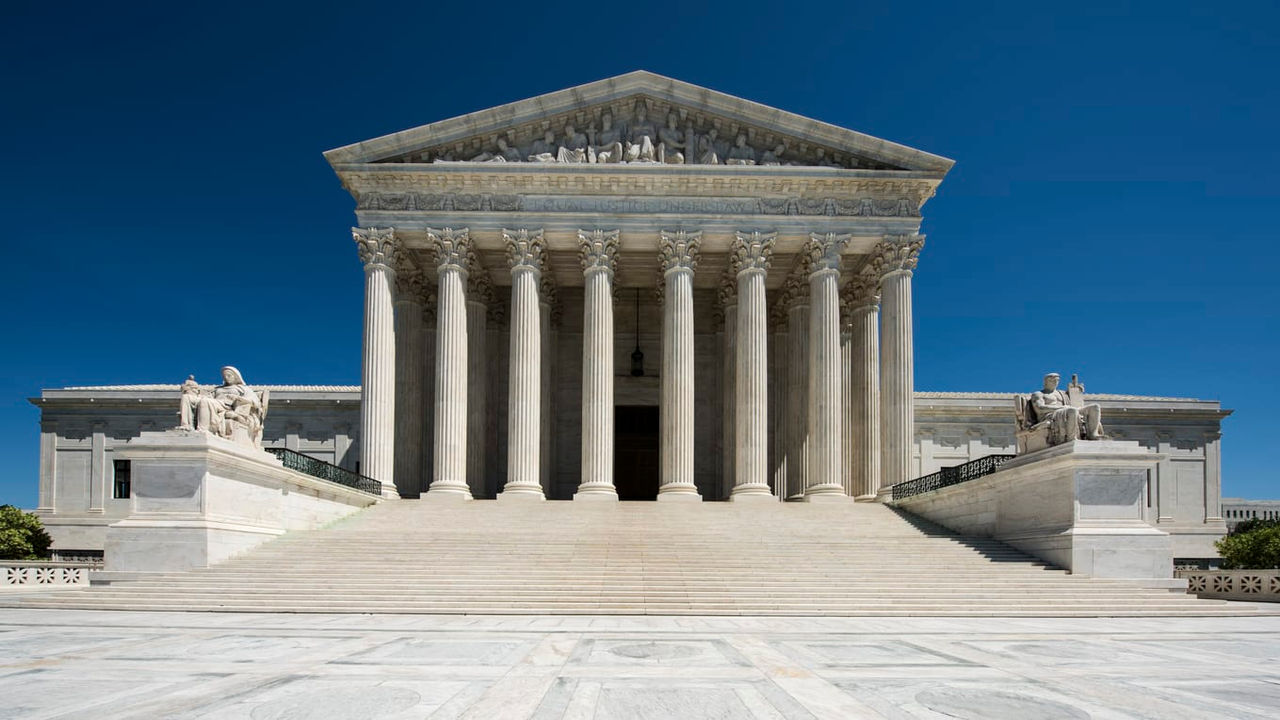[Update: The Supreme Court halted OSHA's ETS on Jan. 13, and OSHA officially withdrew the rule, effective Jan. 26.]
Lawsuits aiming to block the Biden administration's vaccination directives for certain private employers and health care workers will be reviewed by the U.S. Supreme Court in early January.
Under the Occupational Safety and Health Administration's (OSHA's) emergency temporary standard (ETS), businesses with at least 100 employees must ensure workers are vaccinated against the coronavirus or undergo weekly COVID-19 testing. A federal appeals court had temporarily blocked the rule, but the 6th U.S. Circuit Court of Appeals lifted the stay on Dec. 17 in a consolidated action, meaning that employers will have to comply unless the Supreme Court rules otherwise.
Another directive from the Centers for Medicare & Medicaid Services (CMS) requires COVID-19 vaccination for staff employed at Medicare- and Medicaid-certified providers and suppliers. State attorneys general challenged the health care rule in multiple lawsuits with different outcomes. The 5th U.S. Circuit Court of Appeals lifted a district court's order that had blocked the directive nationwide, but the requirement remains blocked in 25 states. The U.S. Department of Justice (DOJ) asked the Supreme Court to reinstate the rule nationwide.
The high court scheduled oral arguments in both matters for Jan. 7 and will not decide whether to block the directives until the arguments are heard.
We've gathered articles on the news from SHRM Online and other media outlets.
Responses Due Dec. 30
Justice Brett Kavanaugh is assigned to hear emergency appeals from the 6th Circuit, but he will likely refer the OSHA ETS challenge to the full Supreme Court. The consolidated action was brought by state attorneys general and private employers that argue OSHA's "claimed authority over [employees'] private lives and vaccine status is an egregious government overreach." The court asked the DOJ to respond by Dec. 30 to the challengers' request to reinstate the stay against the directive. Responses from challengers in the CMS health care matter are also due Dec. 30.
(CNN)
Biden Administration Defends Rules
White House press secretary Jen Psaki said the Biden administration is confident that both directives will be upheld. "Especially as the U.S. faces the highly transmissible omicron variant, it is critical to protect workers with vaccination requirements and testing protocols that are urgently needed," she said in a statement. "At a critical moment for the nation's health, the OSHA vaccination or testing rule ensures that employers are protecting their employees and the CMS health care vaccination requirement ensures that providers are protecting their patients."
(CNBC)
CMS Health Care Rule Paused
States where the health care mandate remains blocked include Alabama, Arizona, Georgia, Idaho, Indiana, Kentucky, Louisiana, Mississippi, Montana, Ohio, Oklahoma, South Carolina, Utah and West Virginia. A Missouri district judge's order that blocked the directive from applying in 10 other states that sued separately also remains in effect after the 8th Circuit recently declined to lift it. On Dec. 15, another district court blocked the directive in Texas.
Tight Deadlines for ETS Compliance
Under OSHA's ETS, employers may choose to require vaccination or allow covered employees who are unvaccinated to wear a mask and provide proof of a negative COVID-19 test on a weekly basis. The start date for the testing requirement has been extended to Feb. 9, but many other components of the ETS take effect on Jan. 10, such as the requirement for employers to determine the vaccination status of each employee and develop a written policy.
Employers Are Feeling 'Whiplash'
"Many employers are feeling a combination of whiplash and organizational fatigue between reconciling their own, private mandates, while tracking the battle in the courts over the government mandates, which remain unsettled, pending the final word of the Supreme Court," said Ian Carleton Schaefer, an attorney with Loeb & Loeb in New York City. "Add to this the complication of the omicron spread and the question of whether to require a booster to become fully vaccinated, and you have a landscape that continues to become increasingly complex."
OSHA has taken the position that the ETS pre-empts state laws that prohibit employer vaccination requirements.
An organization run by AI is not a futuristic concept. Such technology is already a part of many workplaces and will continue to shape the labor market and HR. Here's how employers and employees can successfully manage generative AI and other AI-powered systems.




